Dweezil Zappa - Chicago Music Exchange, Chicago, 10/10/2013
by Lisa Torem
published: 3 / 10 / 2013
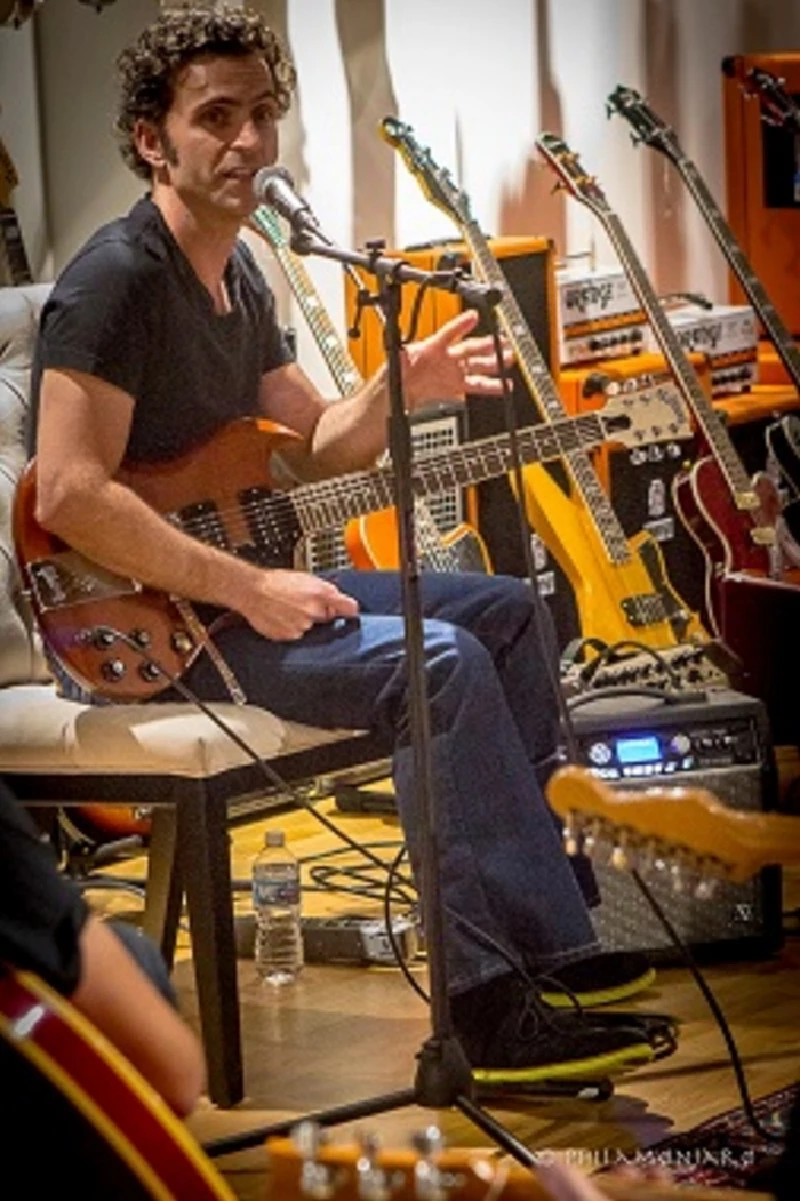
intro
Lisa Torem attends a guitar masterclass from Dweezil Zappa at musical instrument shop, the Chicago Music Exchange
Tyler’s mother ushered the eager 11-year-old blonde guitarist, who has been shredding since second grade, into a front row seat. He would be one of two very young Dweezil Zappa fans, who had come today to witness the rock royal’s 90-minute master class. The timing for the class couldn’t have been better. Later that night, Dweezil and band would be performing ‘Roxy & Elsewhere’, a live album released in 1974 by Frank Zappa and the Mothers of Invention, at the Copernicus Center, a lovely landmark building which traditionally featured ethnic acts, but has more recently curried favour with rockers. Promoter Scott Gelman, of One Eleven Productions, elaborated, “This is a wonderful facility. I remember it as the Gateway Theatre many years ago. It is run by a non-profit Polish organization that was looking to fill more events into a calendar that consisted of mostly ethnic concerts on weekends. I approached them about booking rock concerts into the space and we started a series of shows.” (Upcoming shows will include: Kansas, Pat Benatar and Neil Giraldo, Blue Oyster Cult and Foghat). George Coutretsis, native Chicagoan, and store manager for eight years at Chicago Music Exchange, felt positive about the tie-in between the master class and the concert. “Having the master class allowed us to promote Dweezil’s show that night, not only to the people who bought tickets and took part in the class, but also in the marketing leading up to the class which went up on our social media, email chains, etc. Even if people couldn’t attend the class during the day, they saw that he was performing that night which was great. It was free promotion for the artist,” he said. He also explained the philosophy behind the series and how Dweezil fits the profile. “We try to choose artists that are influential and inspire others to get better. We also want artists who want to be taking part so it doesn’t feel like a burden for them. Fortunately, Chicago is very centralized so artists are constantly coming through town. It also helps that there’s an incredible music scene here; it’s the biggest city in the Midwest. We’re also fortunate that artists love our store. We have one of the biggest selections of both vintage and new guitars in the world, so artists make a point to come in to the Chicago Music Exchange as a part of their tour.” But Dweezil’s appearance was special for an additional reason. Coutretsis explained, “We’ve been putting clinics on for a long time as well as artist in store performances, but this was the first master class offered to the public. The challenge for us was space as it’d be difficult to close the store down for a 90 minute class, but we recently expanded and opened a bass shop which allowed us to keep the store open, and still have a private class for the people who paid.” Soon older fans trickled into the room. Now in his fifties, Chris claimed he “can’t play as fast as he used to,” -- he had been playing since he was a teen, but “sometimes you reach a plateau.” Coutretsis confirmed that the class “brought out people of all ages, and skill levels” and that whilst the majority were clearly Dweezil or Frank Zappa fans, some were also “beginner or intermediate guitar players looking to improve their skills from an amazing guitar player.” He added that this was “a very unique opportunity to get such a hands on, intimate lesson with somebody who has so much experience.” Gelman played an important role as well: “Dweezil’s agent told me this was something that was being done in all the markets. Most of the workshops are done at the concert venue. My marketing director, Kate Darling Bond, came up with the idea of having the event at Chicago Music Exchange where the store did a great job of not only promoting the guitar clinic, but the show at Copernicus Center, as well. Our job as the promoter of the concert and guitar clinic was to promote it locally, set it up and Dweezil did the rest.” Zappa walked into the newly expanded basement shockingly early - at least ten minutes by my watch. Seriously, he possessed no diva traits -- he seemed as comfortable and unassuming as a guy curled up in a Barca lounge ready to tune in to the local Bears game. The store, as Coutretsis explained, is a veritable magnet for locals and touring rockers – in fact, if you didn’t see salesmen behind the sparkling counters, you would think you were in a museum. Vintage guitars and gear lined up strikingly against the wall like colourful Nutcracker soldiers were positioned to take your breath away even if you couldn’t distinguish a Humbucker from a hollow body. As more folks trickled in, Dweezil chatted up young Tyler, who expressed an interest in “sweep picking.” He congratulated the young man for getting started on his instrument so early. Chris said he could use some help on extended lead playing. Dweezil assured him that he could start out with some simple ideas and expand on it. As he queried the fans, he explained his own challenges. “I didn’t have the fundamental theory background growing up, but I’m doing it more now.” Dweezil may not have had a solid grounding in music theory, but he has made up for it in determination. It took more than two years to reproduce key parts of his famous father’s repertoire. As there were no written records, he essentially had to work by ear, whilst bringing his own creativity to many of Frank’s often lengthy and intricate instrumentals. But Dweezil seemed just as committed to teaching, although he seemed stunned by the cavalier approach some of his mentors used. He told a story about having a private lesson from one such guitarist, whose work he respected greatly. The “mad genius that lived like a crazy guy” invited Dweezil to his dingy room, which was overrun with clutter. The “hoarder” wasn’t even dressed properly when Dweezil came over. But he always knew there were virtuosic musicians who could also relate well to students… Dweezil remains committed to running his music programme, Dweezilla. The school was designed so that students could come together to talk about guitar. Dweezil talked about the late Randy Rhoads (Quiet Riot, Ozzy Osbourne), who “got 100 % better” within a year” after facing a career crossroad. The self-taught Rhoads inspired Dweezil, but so have the students who frequent his classes. “Anytime you have a common interest with someone who plays guitar, you’re always going to learn something,” he asserted. Dweezil illustrated many of his teaching points. “I’m assuming most people know pentatonic shapes,” he said, as his fingers floated down the fretboard. But “how can I break out of doing the same thing every day?”Many heads nodded when he said that it was easy to “play everything you ever learned in one two-minute solo.” Having been raised amongst some of his dad’s treasures, Dweezil knows a lot about guitars. He discussed the redesign of the infamous Roxy SG, discussing the “good access to the top frets” but that he sometimes has a “love/hate” relationship with his instruments. He talked about resequencing notes, utilizing rhythmic variation and playing individual notes clearly whilst muting others, and how varying pick strokes affects tone. Many of the twenty-six male participants noodled at their own guitars as light bulb moments occurred. The exciting part was watching Dweezil, his gleaming mass of black curls (even the staff agreed the man has “great hair”) bouncing, as he demonstrated key points. But even as he rattled off strategies, he acknowledged, “I grew up listening to my dad’s music, which broke all the rules.” And, he stressed that even though it hasn’t been easy to play well, “You wouldn’t spend the time if it wasn’t fun.” Dweezil recommended a few ways to compensate for mistakes made whilst performing live, adding,“You can still make it all work.” One guest suggested listening to Gangsta rap for new ideas, which inspired Dweezil to discuss drum trills and horns. As the workshop progressed, the audience involvement increased. Dweezil asked his friend Joe, who was wearing a US army jacket, to plug in his electric and play some familiar chords, as he soloed over them, turning theory to practice. Verbal sparks flew. And even though Tyler didn’t join in on the comments, he quietly played a few muted patterns over the conversation. Dweezil stressed that even disturbing sounds can be riveting if used in the right way. He used some comical theme songs to illustrate the point. When one person asked, “When you improv, are you leaning on bass or drummer?” Dweezil stressed the importance of listening to the entire ensemble, but offered that Frank “was reorganizing ideas based on drum licks” because he had a different background. One participant asked if there would be instructional videos available soon so that fans could learn Frank’s solos, to which Dweezil replied, “Who has the time to learn an 11-minute solo?” He claimed that it took “several days to learn thirty seconds of ‘I am the Slime’.” Dweezil understood the need to satisfy the fans’ interests, but acknowledged that producing such videos requires enormous time and attention to detail. Nothing replaces the art of live teaching. His Dweezilla camps are hosted by guitarists he considers to be “at the forefront of modern guitar, and who are “extremely adept at imparting their knowledge in easy, compartmentalized ways.” His most recent camp took place in July in Big Indian, New York. Derry Gabel, composer of ‘Lydian Flight,’ was there. He is an expert at commanding cool legato phrases and creating a fusion of solos over Lydian progressions. Israeli-born Oz Noy was voted the “Best out there guitar player of 2013.” Noy employs thrilling blues riffs in his solo work and has designed several improvisational DVDs. The UK’s Tom Quayle, a wizard at soloing over standard progressions, also participated in this intensive summer camp. The slogan, “Leave and Destroy” leaves little to the imagination. As Dweezil faced the class, it was easy to forget that he would be off to perform one of his dad’s most influential albums in just a few short hours. He wound up the class by posing for photos and signing a few albums, showing none of the ego that flanks the typical rocker. His casual demeanour belied his intense work ethic. The fit and friendly Dweezil Zappa has thought long and hard about the power of music, how it brings people together, how he yearns to keep his prolific father’s collection alive for a new generation and the purity of sound production. Dweezil states better than anybody on his website. “Tone is the delivery system to the audience. The character of your sound is as important as the roles you play and I think it’s important to explore this topic in detail.” Marc Najjar, a bassist and manager of the bass shop at Chicago Music Exchange, caught much of the camaraderie, Thursday afternoon.“Being a huge Zappa fan myself, the clinic was incredibly informative and engaging – even as a bassist. It was beyond evident that everyone involved walked away with new ideas on approaching music, be it composition, soloing, or simply practicing. In short, the event was refreshing and entertaining.” Gelman described Zappa as “very personable” when dealing with the attendees. He added, “He explained what he was taught by his father and how he is taking those lessons to other musicians.” I asked George Coutretsis what Dweezil was like behind the scenes and what he felt fans gleaned from the workshop and he replied: “Dweezil was fantastic to work with. He was genuinely a great guy who loved to teach and make people better. He covered everything from rhythm and lead playing, pick technique, how to play with others, and great tips on how to take what you already know and make it better. To me, what was most interesting was the idea that no note is the wrong note. This definitely goes back to how Frank played, but just the idea that you can make even the most sour note make sense if what you play next fits; just the idea that there shouldn’t be any rules in guitar playing…” He concluded: “Every guitar player is always looking to be inspired or to pick up any tip or secret they can to improve their playing. From there, you develop your own style, but to be able to learn something new from somebody as skilled as Dweezil is quite a unique opportunity. Frank Zappa was a very interesting guitar player as he wasn’t afraid to mix any and every style of music into his playing. Unfortunately, he’s not around anymore to pass along his wisdom, but it’s pretty cool that his son is carrying on his legacy, and teaching new (and old) fans some of his tricks of the trade.” So did Tyler come away understanding a host of new shapes and a plethora of pentatonic patterns or did he just crawl into bed snuggled alongside his guitar whilst the older cats caught Dweezil’s live act? It’s hard to say, but one day he’ll realize he’s got a really cool mother – there he was shredding away with a rock star after school while his buddies plowed through social studies and math homework. Now that’s rock and roll. Special thanks to Chrissy Hansen, Mark Najjar and George Coutretsis of Chicago Music Exchange, Scott Gelman, One Eleven Productions and Dweezil Zappa. The photographs that accompany this article were taken by Philamonjaro at www.philamonjaro.com.
Band Links:-
https://www.dweezilzappa.com/https://www.facebook.com/DweezilZappaOfficial/
https://twitter.com/DweezilZappa
Picture Gallery:-
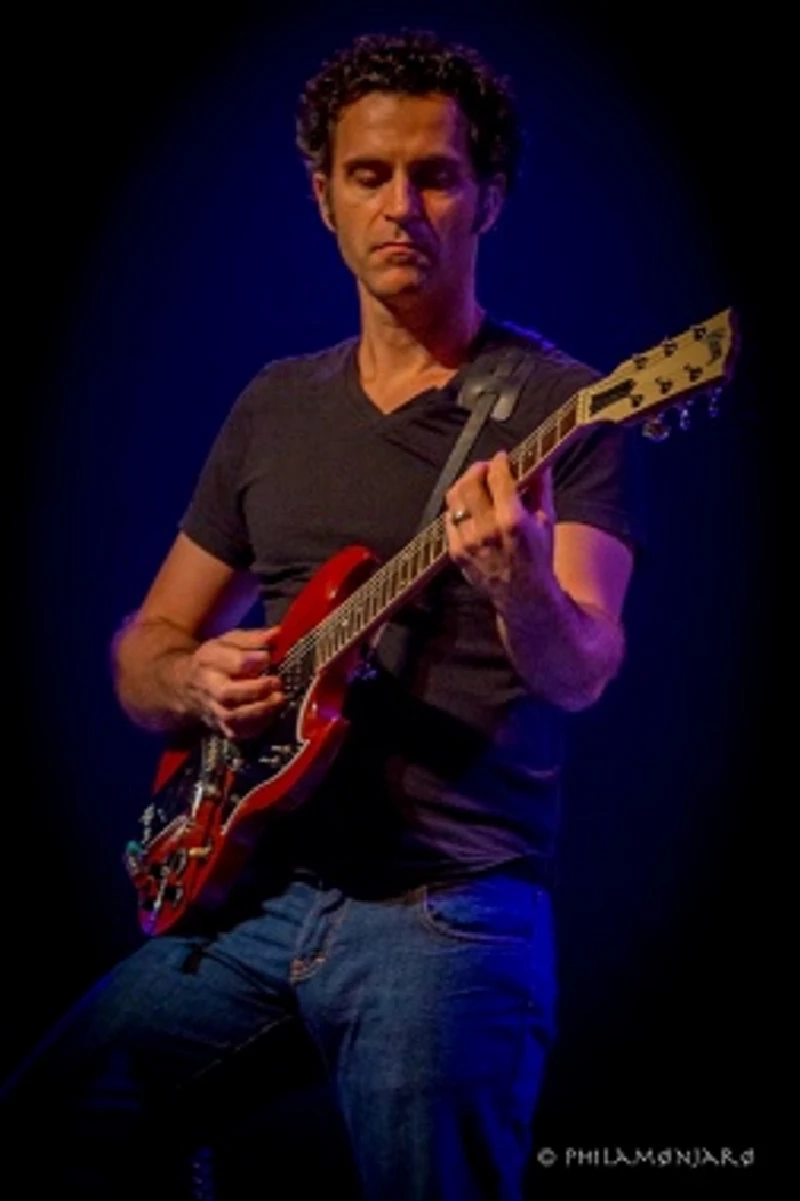
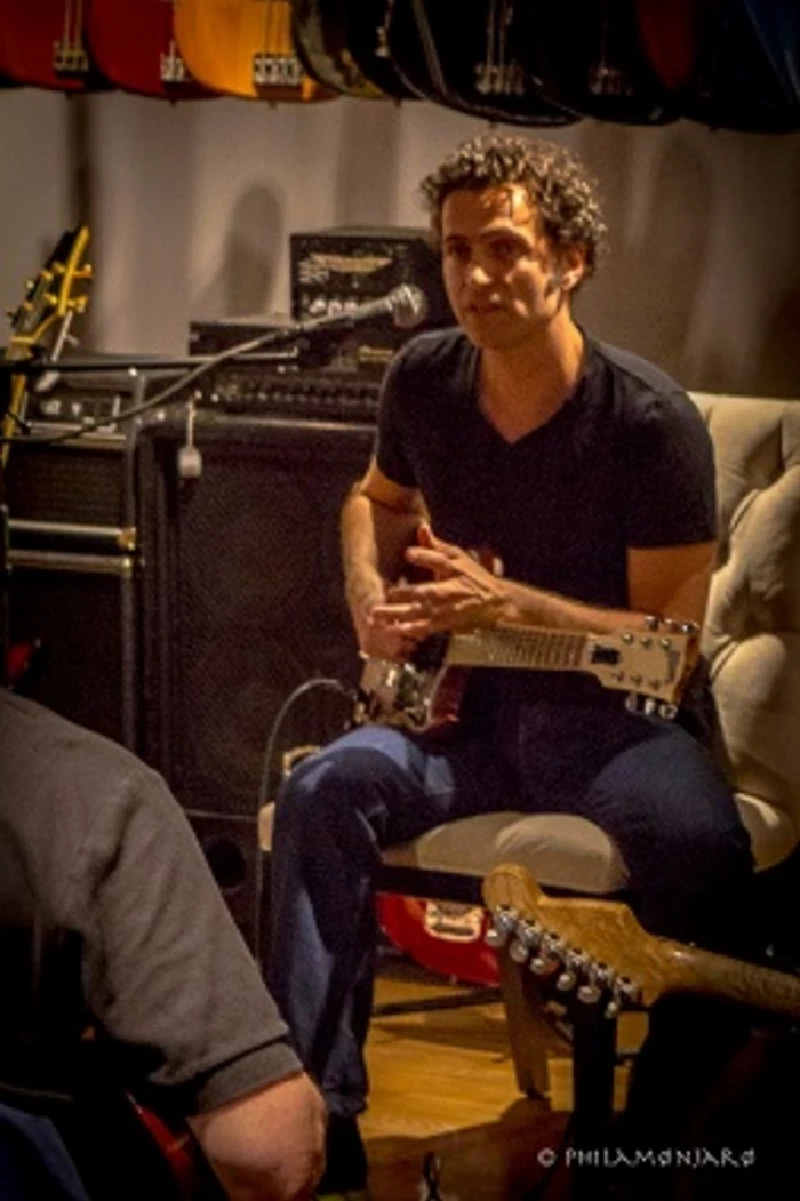
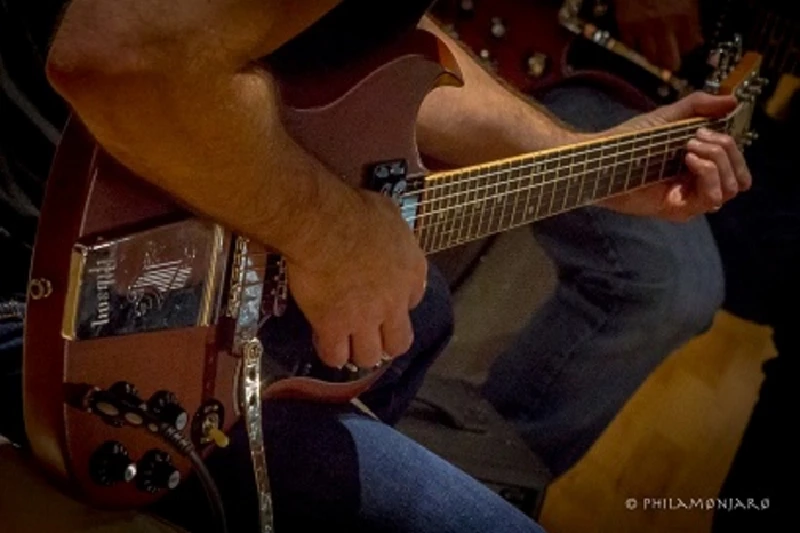
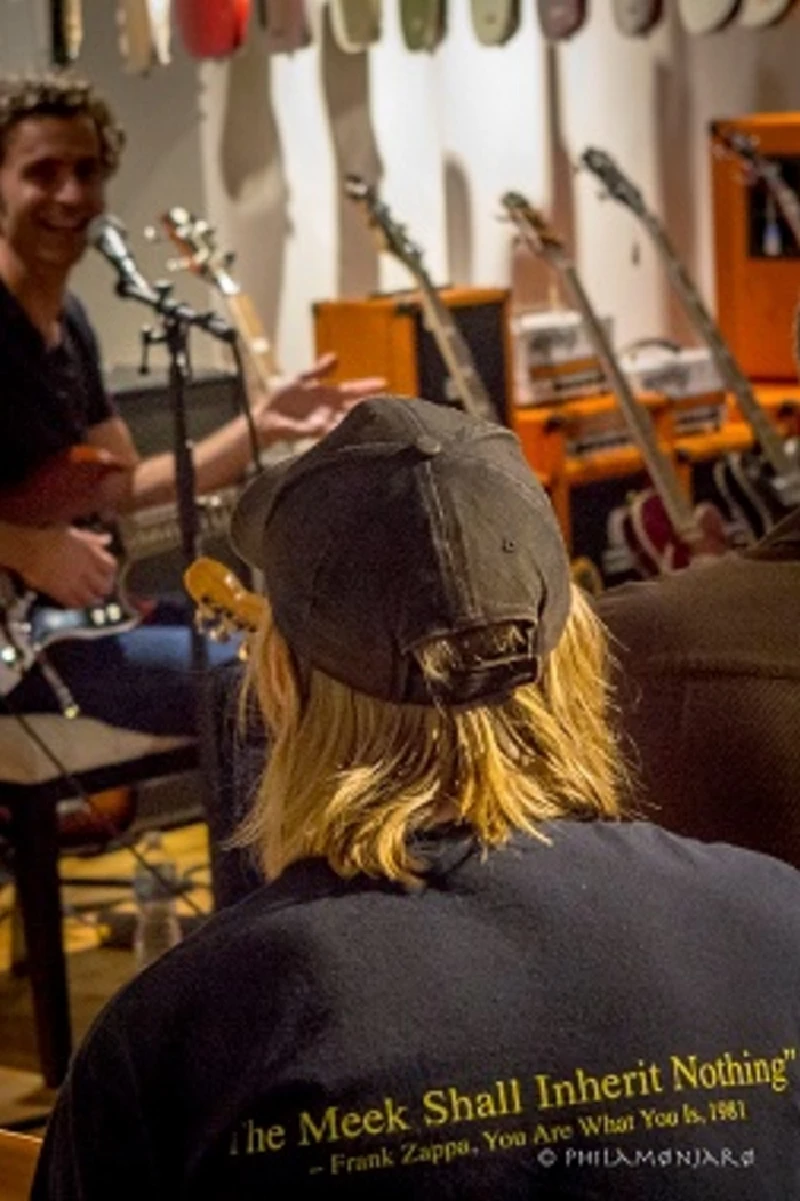
interviews |
|
Interview (2017) |
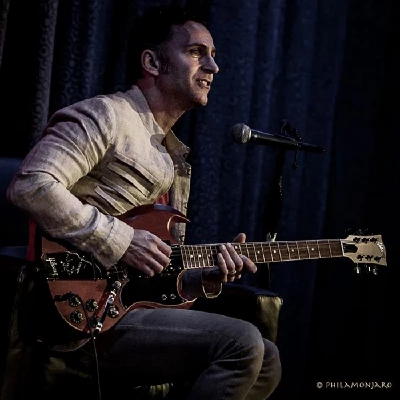
|
| American guitarist/composer/actor Dweezil Zappa chats to Lisa Torem about his forthcoming UK tour and his father Frank's legacy |
| Interview (2011) |
live reviews |
|
City Winery, Chicago, 7/7/2017 |

|
| American guitarist and educator Dweezil Zappa entertains fans at City Winery Chicago with delightful stories about his father, formative career and more, using his red SG for effect. |
| Royal Concert Hall, Nottingham, 12/11/2012 |
soundcloud
reviews |
|
Return of the Son of... (2010) |
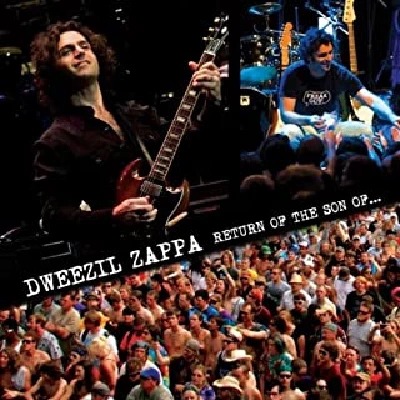
|
| Exhilirating and provocative double CD collection of covers from Dweezil Zappa of his late father Frank's work |
most viewed articles
current edition
John McKay - InterviewRobert Forster - Interview
Cathode Ray - Interview
Spear Of Destiny - Interview
Fiona Hutchings - Interview
When Rivers Meet - Waterfront, Norwich, 29/5/2025
Carl Ewens - David Bowie 1964 to 1982 On Track: Every Album, Every Song
Chris Wade - Interview
Brian Wilson - Ten Songs That Made Me Love...
Shrag - Huw Stephens Session 08.12.10 and Marc Riley Session 21.03.12
previous editions
Heavenly - P.U.N.K. Girl EPBoomtown Rats - Ten Songs That Made Me Love....
Allan Clarke - Interview
Oasis - Oasis, Earl's Court, London, 1995
Manic Street Preachers - (Gig of a Lifetime) Millennium Stadium, Cardiff, December 1999
Barrie Barlow - Interview
Pixies - Ten Songs That Made Me Love...
Beautiful South - Ten Songs That Made Me Love...
Trudie Myerscough-Harris - Interview
Dwina Gibb - Interview
most viewed reviews
current edition
Peter Doolan - I Am a Tree Rooted to the Spot and a Snake Moves Around Me,in a CircleGarbage - Let All That We Imagine Be The Light
Vinny Peculiar - Things Too Long Left Unsaid
Vultures - Liz Kershaw Session 16.06.88
John McKay - Sixes and #Sevens
Little Simz - Lotus
HAIM - I Quit
Morcheeba - Escape The Chaos
Pulp - More
Lapsley - I'm a Hurricane, I'm a Woman In Love
Pennyblackmusic Regular Contributors
Adrian Janes
Amanda J. Window
Andrew Twambley
Anthony Dhanendran
Benjamin Howarth
Cila Warncke
Daniel Cressey
Darren Aston
Dastardly
Dave Goodwin
Denzil Watson
Dominic B. Simpson
Eoghan Lyng
Fiona Hutchings
Harry Sherriff
Helen Tipping
Jamie Rowland
John Clarkson
Julie Cruickshank
Kimberly Bright
Lisa Torem
Maarten Schiethart